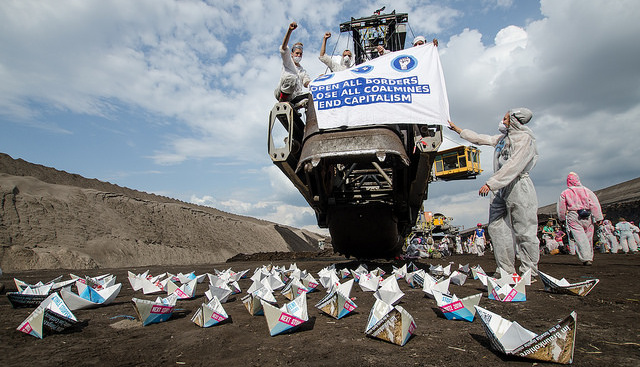By Fabian Scheidler
In the face of climate change, financial crises and mass poverty, a growing number of people agree that we need a fundamental social-ecological transformation that includes all areas of society. Luckily, a huge variety of concepts and practices for such transformation already exists. These, however, have not yet been able to leave their niches. Why is this so difficult? Are they not suitable for a more broad transformation? Are they not economically viable?
The fact that we keep clinging to damaging structures and ignore the socially and ecologically viable is due to an often underestimated reason: The tendency of governments to subsidize the wrong things. This happens in direct and open as well as in hidden and indirect ways.
Even according to conservative estimates by the International Energy Agency, the annual global subsidies of the oil, gas and coal industry amount to at least 544 billion dollars. A fraction of these funds would suffice to finance the conversion towards renewable energies. In addition, governments massively subsidize the automotive and aviation industries by not holding them liable for damages they cause to the climate and the environment. While our streets are flooded with paramilitary gas guzzlers promoted by the tax privilege for company cars, the Berlin public transport company for example cannot find tram drivers because they are too badly paid.
The industrial agribusiness that accounts for approximately a third of the global greenhouse gas emissions and the rapid destruction of soil and sweet water reservoirs is another sector that is massively subsidized. The European Union alone forks out about 100 billion Euros for it every year. This is although we already know that in the long term small-scale organic farming can sustain more people than industrial agriculture. In the light of theses figures, the talk about "free markets" is a myth. In fact, the capitalist "mega-machine" is only able to function because governments throw lifelines to its main profiteers.
The banking system, yet another sector sustained by trillions of subsidies, plays a central role in the current disorder. The bail-out of German banks alone has cost 100 billon dollars since 2008 – a third of the entire federal budget. The business model of large banks is problematic in itself, granting credits based on a single requirement: that of maximal profit. This usually means to support those kinds of investments that successfully shift their social and ecological costs to the community. On the contrary, services to the common good generate no or less profit and are therefore less likely to obtain credits. Not to mention that large banks, due to their structure, prefer large projects because they are more profitable. This blocks decentral development (small is beautiful !).
We need a monetary and banking system that operates according to fundamentally different criteria – including other legal forms and structures of ownership. Cooperative banks and regional savings banks offer some promising approaches here, but remain niches as long as they operate in the shadow of highly subsidized mega-banks.
In the very likely case of a renewed financial crisis, the withdrawal of subsidies in this sector would simply mean not to save them any more, or at least not to save them unconditionally. Already, legal instruments are available to dismantle failing mega-banks, to secure important deposits such as pensions and leave other creditors to well-deserved bankruptcy. The remainders of such banks could be transferred into other legal forms bound to the common good instead of shareholder profit. Such financial institutions could provide funds for the conversion of the energy system, transport and agriculture to sustainable structures.
In other words: in the long term we need a totally new frame for our economic activity that generally puts the principle of the common good before profit. Utopian? Maybe. The continuation of the current system, however, is at least equally utopian.
Such far-reaching transformation cannot succeed without larger political struggles. Should alternatives really be meant to leave their niches and reach a systemic threshold, we need to account for the growing resistance of the powerful interest groups.
The business model of the dinosaurs is based on the silence and apathy of the citizens and an atmosphere of post-democracy. Let's not grant them this silence. ------------------------------------ Translation: Christiane Kliemann Further information about Fabian´s book “Das Ende der Megamaschine. Geschichte einer scheiternden Zivilisation” is available here

6 Thesen zur laufenden Debatte um den Kohleausstieg in Umwelt- & Klimabewegung Die Debatte um den klimapolitisch notwendigen Kohleausstieg wird seit Jahren ohne Ergebnis geführt. Die Politik duckt sich bisher aus Angst vor den Reaktionen aus den betroffenen Regionen weg. Sie ignoriert dabei, dass die jahrelange Verzögerung der aktiven Gestaltung des Strukturwandels die Ausgangslage de...

Während der internationalen Degrowth-Sommerschule an der »Universitat Autònoma de Barcelona« unterhielt sich Felicitas Sommer mit dem Commons-Forscher Aggelos Varvarousis, der Soziologin Lúcia de Oliveira Fernandes und dem Aktivisten und Wissenschaftler der ökologischen Ökonomien Claudio Cattaneo. Felicitas Sommer: In vielen südeuropäischen Ländern brechen die öffentlichen Versorgungssysteme zusammen. Der Zugang zu medizinischer Versorgung und öffentlichen Bildungseinrichtungen, der [...]
Auf der Suche nach einer Zukunft jenseits des Wachstums haben wir, zwei Studierende aus Berlin, uns auf Reisen gemacht. Wir werden Orte besuchen, die bereits heute weit weg von Berlin und Brüssel gesellschaftliche Alternativen leben. Zuletzt berichteten wir über die Sozialistische Selbsthilfe Mülheim in Köln. In diesem Beitrag teilen wir unsere Eindrücke aus unserer Zeit [...]